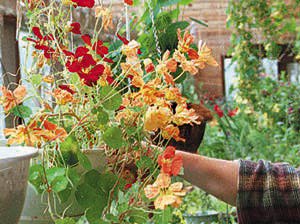
David E. Dale/Herald
Vegetables grow in abundance in this solar green house in Sandy Lake. Darrell and Linda Frey depend on their biosphere for crops, many of which are sold to restaurants in Pittsburgh.
 David E. Dale/HeraldVegetables grow in abundance in this solar green house in Sandy Lake. Darrell and Linda Frey depend on their biosphere for crops, many of which are sold to restaurants in Pittsburgh. |
